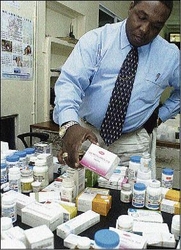Prescribed high - Addicted to doctor-recommended medication
Published: Sunday | July 19, 2009

Ricardo Makyn/Staff Photographer
Detective Corporal Kirk Roache of the Spanish Town Police Station displays a few of the drugs confiscated from an illegal pharmacy.
Tyrone Reid, Sunday Gleaner Reporter
MANY MEDICINE cabinets are morphing into private drug dens as an increasing number of Jamaicans are abusing prescription medications.
Dr Ellen Campbell-Grizzle, director of information and research at the National Council on Drug Abuse (NCDA), told The Sunday Gleaner that prescription abuse was a "growing problem" on the island, recently adjudged to be the third-happiest country in the world.
She warned that Jamaica must take its cue from the United States of America's burgeoning prescription-abuse problem.
"They say tek sleep and mark death. What is happening in the US is instructive to us, that we need to be active and pre-emptive in dealing with prescription-drug abuse," she said.
Abuse of over-the-counter drugs, such as cold and cough medicines, is also a problem, said Dr Campbell-Grizzle.
Growing problem
A report done by the US-based National Institute on Drug Abuse, an arm of the National Institutes of Health (NIH), an agency of the Department of Health and Human Services (HHS), revealed that "the non-medical use or abuse of prescription drugs is a serious and growing public-health problem" in America.
The NIDA research report, printed in July 2001 and revised in August 2005, and entitled Prescription Drugs Abuse and Addition, stated that "an estimated 48 million people (ages 12 and older) have used prescription drugs for non-medical reasons in their lifetimes. This represents approximately 20 per cent of the US population".
Dr Sheila Campbell-Forrester, chief medical officer (CMO) in the Ministry of Health, concurred that international trends should raise red flags locally. "The Michael Jackson case has opened up a can of worms," she said.
The last national study commissioned locally by the NCDA was done in 2001. It was entitled National Household Survey of Drug Use and Abuse in Jamaica.
The survey noted that approximately one in every two persons (41 per cent) said that they had at sometime taken drugs that had not been prescribed for them by a doctor. The study, which was published in November 2002, also stated that "in the past year, 31 per cent (one in three persons) used unprescribed drugs".
David Gordon, field officer at the NCDA, said that unprescribed drugs referred to over-the-counter drugs or medication which required a prescription, but somehow, persons managed to get the drug or a refill without having a doctor write a prescription.
'Morning after' pill
In late 2003, The Sunday Gleaner reported that pharmacists across the island had raised an alarm about the abuse of the popular 'morning after' pill, Postinor 2. The drug experts said the tablet was being abused by persons, including schoolchildren, and called on officials in the Ministry of Health to rethink the decision which had made the pill available over the counter six months earlier.
Three years later, the NCDA commissioned a national school survey, which was submitted to the Organisation of American States/ Inter-American Drug Abuse Control Commission.
"When we did the school survey in 2006, we saw the worrying sign that students were using addictive substances to deal with stress. They were self-medicating," Dr Campbell-Grizzle said. The students were found to be abusing alcohol, tranquillisers and stimulants.
She added: "The data are suggesting that we need to be pre-emptive. It is an emerging problem (that) requires pre-emptive action."
Tiana Thomas, a pharmacist at Moodies Pharmacy in New Kingston, said the abuse of prescription drugs is something that needs careful analysis. Thomas said she had, during her three years as a pharmacist, detected abuse, and after doing the necessary checks with patients' doctors, she had refused to dispense the drugs to the abusers.
"Not because I don't fill the prescription doesn't mean that somebody else won't," Thomas said. She said sometimes the pressure that comes to bear on pharmacists while dispensing drugs for many patients prevents them from exercising the vigilance required to detect abusers.
Thomas also pointed out that she had come across cases where patients had written their own prescriptions. This forgery, she explained, usually happened in a hospital setting where it was generally easier to access prescription sheets.
She also said that she had encountered serial prescription abusers who had gone to great lengths to satisfy their craving. Thomas revealed that some patients visited two or three doctors about the same complaint and got each doctor to write a prescription for the same drug, and then got all of them filled.
"There are cases like these for controlled substances and sleep aids. Some of these drugs will give you a high, so the patient may feel exhilarated, and they like that effect," she said.
Prescription drugs, manufactured to cure ailments, usually have side effects. Thomas said some patients took the drugs for the side effects and not the sickness.
Dr David Tavares, a clinical pharmacist at Hilton's Pharmacy in Montego Bay, said when he has suspected the abuse of painkillers, it has been mostly among foreigners. Anti-anxiety medication, sexual stimulants, or drugs for impotence are usually the ones abused by the locals, he said.
"When it comes to narcotic painkillers, people walk in off the street and ask for them, even though they know it needs a prescription."
tyrone.reid@gleanerjm.com








